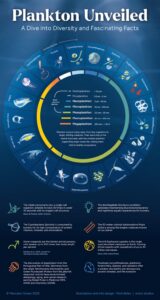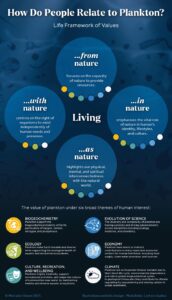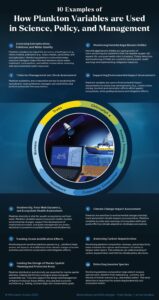From the microscopic to lengths of up to 50 metres, living hours to years, and found in an array of shapes and colours, plankton is arguably one of the most fascinating groups of species found on Earth. In aquatic environments, they form the basis of the food web, produce oxygen, transport carbon down to the deep, and influence water quality. As explained in a recently published study led by Dr Maria Grigoratou (Mercator Ocean International) and in collaboration with an international team of experts, plankton provide a range of valuable but to many, unknown benefits to people.
Published in Bioscience, the open-access (free to read) paper “The immeasurable value of plankton to humanity” showcases the many benefits of plankton. These includes krill, jellyfish, and the juvenile stage of other species such as corals, octopus, and fish, provide through the thematic lenses of “biogeochemistry,” “ecology,” “climate,” “evolution of science,” “economy,” and “culture, recreation, and well-being.”
“Plankton is the foundation of all aquatic ecosystems, sustaining life both in the water and on land. These organisms are incredibly diverse, complex, and beautiful and play a crucial role in shaping our planet. Yet their significance often goes unnoticed. As a group of plankton experts and enthusiasts, we aimed to create a go-to resource for anyone curious about plankton and its profound impact on human life.
From regulating climate and supporting food webs to driving scientific discoveries, influencing economies, and enhancing human well-being, this article provides a holistic perspective on the many ways plankton diversity shapes our world. We hope it inspires a deeper appreciation for these microscopic yet essential organisms and their role in sustaining life on Earth.”
Maria Grigoratou, lead author
Benefits include health developments such as antibiotics, economic benefits through sectors such as cosmetics and food supplements, food security by supporting fished and cultured species, offering scientific insights into evolutionary processes, being part of agricultural products such as phosphate, which is mined from plankton deposits, regulating climate, and providing inspiration for art, fashion, and music.
With plankton facing increasing stress from climate change, eutrophication, pollution, and other human-driven pressures, improving our knowledge of plankton and reducing human impacts has never been more critical.
The article also features a dedicated section on how plankton variables are integrated into policy and conservation frameworks across various countries, with examples such as the European Water Framework Directive. Notably, following the 2022 IPBES Values Assessment, the authors introduce the value of plankton within the “Life Framework of Values” for the first time. This introduction could raise awareness and offer policymakers a more holistic perspective, integrating ecological, cultural, and economic considerations into sustainable biodiversity decision-making.
The authors also identify four key action areas to advance and sustain plankton research, including harmonising and standardising data and expanding sustained plankton research using a range of tools, including Earth observations collected with technologies such as satellites and underwater gliders, modelling and forecasting.
“This article serves as a vital resource for policy officers, offering a comprehensive and cohesive perspective on the diverse values that plankton diversity brings to humanity. The authors go beyond theory by providing concrete examples of how plankton variables have been integrated into policy frameworks, laws, regulations, commercial catch agreements, and monitoring and assessment programs directly linked to national legislation or management actions across Africa, the Americas, Australia, Europe, and Japan. This makes it a valuable reference for policy officers seeking to understand how plankton variables are applied in policy contexts and to explore opportunities for aligning local and regional efforts with global initiatives.
The EU has long recognized the importance of plankton, incorporating many plankton variables as indicators of good environmental status in the Marine Strategy Framework Directive (MSFD) and the EU Water Framework Directive. Plankton is also central to key EU platforms and services such as Copernicus Marine and the EU Digital Twins of the Ocean. Furthermore, plankton research has been a strong focus of numerous EU-funded initiatives, as reflected in this article. We are pleased to see that EU projects including EU4OceanObs2.0, BioEcoOcean, NECCTON, C-BLUES, SEA-Quester, OceanICU, and the EU Next Generation María Zambrano program have supported several of the authors and contributed to the development of this important work.”
Ivan Conesa Alcolea, Policy Officer, DG Research & Innovation
This article is a community effort of 47 authors based in 21 countries across the globe. The authors met at the 2020-2021 online plankton workshops organized by the Marine Biodiversity Observation Network (MBON).
Funding acknowledgement
This paper is supported by the EU-funded projects BioEcoOcean and EU4OceanObs.
Additional information
- The peer-reviewed paper “The immeasurable value of plankton to humanity,” published in Bioscience:
https://academic.oup.com/bioscience/advance-article-abstract/doi/10.1093/biosci/biaf049/8172382 - Marine Biodiversity Earth observation value chain case study:
https://www.eu4oceanobs.eu/wp-content/uploads/2024/09/EU4OceanObs-marinebiodiversity_Sept2024.pdf - The EU Water Framework Directive:
https://environment.ec.europa.eu/topics/water/water-framework-directive_en - IPBES 2022 Value assessment:
https://www.ipbes.net/media_release/Values_Assessment_Published - MBON
https://marinebon.org/ - MBON 2020-2021 plankton workshops
https://aslopubs.onlinelibrary.wiley.com/doi/10.1002/lob.10479
G7 Future of the Seas and Oceans Initiative (FSOI)/ Global Ocean Observing System (GOOS) Workshop, “Towards a global marine plankton observing network: development of a strategy and implementation plan”: https://www.eu4oceanobs.eu/towards-a-global-marine-plankton-observing-network/







